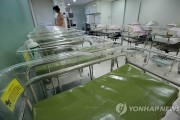Article from KyungHyang:
Polarization of income distribution has reached a critical point
The vicious circle of income inequality is threatening the market economy of Korea. Distribution of wealth has emerged again as the key issue for economic growth and common people’s life.
Mr. Choi (45), who has been working hard as a cab driver for the last 20 years, still thinks that he has not escaped from poverty.
He worked more than 70 hours behind the wheel last week that included the day for local elections and Memorial Day. His wife has been a temporary clerk at a mall for 2 years after working at sales in an insurance company. The monthly income of Choi’s family is about 3.7 to 3.8 million won. Choi said, “It is almost impossible to save money and we cannot even think of traveling. My one and only hope is to move to a new place with 3 rooms for my son and daughter.”
Prof. Lee Jeong-wu, who served as policy chief during the Roh Mu-hyun administration, said, “Polarization of income distribution generates an economic recession, and people feeling an economic loss have reached their limits. We have come to a point where the issue of distribution can no longer be ignored.”
According to an announcement from the IMF last year, GDP per capita in Korea was 24,329 dollars. If a family consists of 4 members like the Choi family, their annual income should be around 100 million won. However, these families who earn 100 million won annually are regarded as the top 10%. Household survey data by Statistics Korea suggests that the lowest income of the top 10%, a family having more than 2 people and working in an urban area, was 93,681,408 won.
For the last 30 years, Korea has experienced rapid economic growth. Korea is ranked at 15th in the world in terms of GDP, and has top leading companies including Samsung and Hyundai. The life of common individuals, however, is miserable and unfortunate due to unequal distribution of wealth. 1 out of 6 people live with less than 10 million won per year, and 1 out of 4 households is more often in the red than in the black. The poverty rate of people over 65 years old is 48.5% which is 3.4 times higher than that of the OECD average. Moreover, the suicide rate is among the highest in the world.
The problem is that the income polarization is worsening as time passes. According to Statistics Korea, the average monthly household income of the top 10% was 10,627,099 won. It is 5.1 times higher than that in 1990, which was 2,097,826 won. For the bottom of 10%, the figure increased 3.6 times from 248,027 won to 896,393 won. During the same period, the gap between these two groups increased from 8.5 times to 11.9 times. The data is based on 8,700 households, not including the extremely poor or Chaebol families, so the actual gap appears to be much larger. Despite this, the government delays implementation of the policies for economic democratization and makes cuts to social welfare while it pulls back regulations for big companies and the rich.
Deterioration in wealth distribution not only makes one’s life harder, but also brings about conflicts between people of different economic classes. It diminishes the vibrancy of economy and threatens the existence of economy in capitalism. Joseph E. Stiglitz, a Nobel Prize winner in economics, warned us in his book 〈The Price of Inequality〉 saying, “Inequality impedes economic dynamism, efficiency, and productivity. A distribution system independent of efficiency becomes a vicious cycle. In turn, all of society sinks.”
Comments from Naver:
jeon****:
If you’ve ever played the board game ‘Blue Marble’ before, you will know the rich will be richer. That’s what capitalism is about. Unlike the game, even the starting point isn’t fair for everyone in reality.
uner****:
If I agree with this article, I will be called ‘bbalgaeng-i’ [commie] by slaves in the same poor situation, ke ke . Frankly speaking, income polarization will be more extreme due to those slaves who can’t think…
kate****:
Even under these circumstances, there are many people saying if Samsung fails, so does Korea.
good****:
The combined monthly income of my girlfriend and I is just over 5 million won after taxes, and we don’t know how we can get our own house in Seoul. To use a rental housing system in Korea we should get married first. If you have a baby, the system is more advantageous. But we’re not planning to have a baby right after the marriage so marriage seems pointless.. People don’t have babies if they’re not confident with their future, unless they’re living in developing countries where they don’t do much family planning. What’s the use of complicated statistics? To figure out how young people are living, it’s more than enough to just look at the birthrates in Korea.
pebb****:
It is just like a scene from a movie. How depressing.
kimy****:
What I can’t understand the most in the world is a poor conservative.
dies****:
You should blame the people who voted for Lee Myung-bak, a lowly person with no philosophy, hoping that their house prices would rise.
mas6****:
The country does have a problem. People who work hard have a hard time making ends meet while celebrities who just sing and show off their faces are living as billionaires, and cheaters and swindlers are well-off.
spec****:
However, those people who are suffering from poverty would support privatization, oppose tax increases, regard welfare advocates as commies and vote for the Saenuri Party.
hana****:
The income polarization is getting stronger not only among companies but also among individuals. Samsung Electronics is taking half of the profits in the listed market. Bankruptcy for small businesses is happening every day, and however hard individuals work, it is still hard to make a living. A ladder of hope is created not by individuals, but by an institutional system to support them. A good society is where people who try to work hard can live well.
doct****:
In Germany, people are not discriminated on grounds of their educational backgrounds. 4th grade students are already separately preparing for entering a vocational school like Realschule or an academic school like a Gymnasium. People choose jobs according to their aptitude. There is no practical difference in wages between big and small companies. Rental housing is run by the government, and people don’t need to worry about it. No school fees, no private educational market like hagwons in Korea. Every weekend a family goes camping in a suburban area and children play football. Middle-aged people collect cars, and the old travel all over the world. It is true that the Germans are outstanding people.
mas6****:
In Korea, if you live an honest life, you will be poor as a beggar. To own a building, you should steal something or fool somebody, and you will live happily ever after. Money does everything in Korea! Cheers!
jin0****:
The insane prices as well as the income gap are a problem. No good life for the middle class as long as the issues of housing and raising children go unsolved. The future seems gloomy.
tldn****:
It’s easy to redistribute income. Raise the hourly minimum wage to 10,000 won. The rich will definitely say the company will fail due to the wage increase, and so will Korea. This is just bullshit. Though the big company makes lots of profit, their subcontractors have never properly been rewarded for it. The tyranny of big companies keeps the technologies that small companies have from growing. However, small companies aren’t doing their job properly, either. They focus on hiring people for low wages for temporary gains rather than on investing its budget in improving production facilities. This kind of management has reached the limit, and the companies are losing its competitiveness.
veil****:
The dynamic movement between social classes is coming to the end. Students should study hard to become professionals. Even most of professionals may remain in the middle class soon. If the movement between classes is closed, the obsession with entering a good university will diminish.
phs7****:
Money brings money and debt brings debt!








